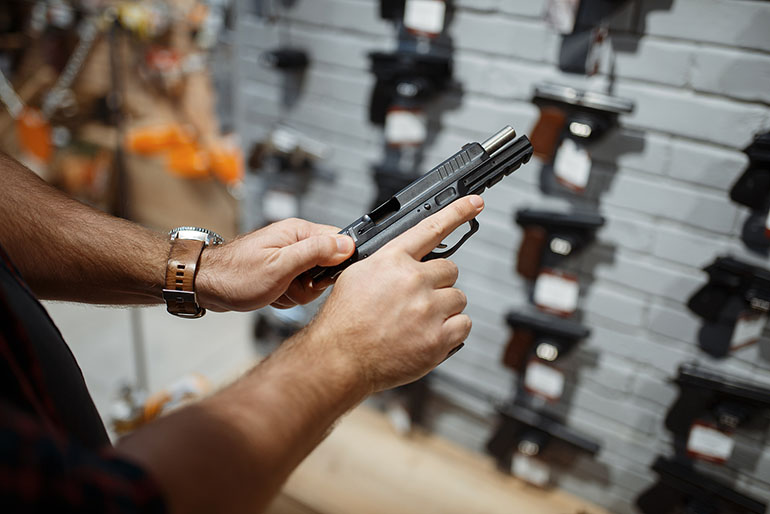
Conservative jurists and gun rights advocates have strongly backed the Supreme Court’s originalist view of 2nd Amendment law, which gives modern deference to the intentions of the nation’s founders at the ratification of the Bill of Rights in 1791. They bristle over the fact that many of the laws at the time took for granted the government’s right to place limits on at least some people’s gun rights.
Scholars say the issue highlights the absurdity of the Supreme Court’s position that the legitimacy of any modern gun law should hinge on whether such a regulation might have fit into a centuries-old legal system — especially one so profoundly flawed in other ways. Liberals also scoff at the notion that the authors of the Bill of Rights could have envisioned modern assault rifles.
[UCLA Professor Adam] Winkler said the debate “points out the central problem of 2nd Amendment law today: that the government has to rely on ancient laws that were designed for a very different society.”
“One of the major concerns around gun laws then was keeping Black people powerless in the face of white supremacy,” he said. “Our gun laws today reflect modern concerns, not the concerns of yesterday.”
Erwin Chemerinsky, dean of the UC Berkeley School of Law, said the rejection of such racist laws as historical “analogues” under the Bruen test by conservative judges such as Benitez reflects a troubling double standard. Benitez has otherwise embraced Bruen’s historical lens, including in recent decisions — also under appeal — that struck down California’s bans on assault-style weapons and large-capacity ammunition magazines.
“Judge Benitez looks at history when it supports his position and ignores it (or dismisses it) when it doesn’t,” Chemerinsky wrote in an email to The Times.
“It is absurd to decide what gun regulations should be allowed based on the law of 1791,” he wrote. “But if we are going to do that, we have to accept the awful aspects of the law of 1791.”
Others say the absurdity lies in the suggestion that unconstitutional, racist laws of the past should hold any legal weight today.
Stephen Halbrook, a conservative author who argues against broad restrictions on the 2nd Amendment, said he is “glad this is being called out” in Benitez’s latest opinion.
“This should never have been an argument,” Halbrook said, arguing that past injustices do not justify modern ones when it comes to people’s constitutional rights.
Some Black gun owners also expressed unease at the idea that old, racist gun laws should be revived in discussions about 2nd Amendment limits.
Rick Archer, 57, of Yorba Linda, is a Black former U.S. Marine who now teaches basic gun safety and concealed-carry training courses in Orange County. He said he views many of California’s modern gun laws as racist, if not in their explicit language then in their origins and their enforcement in communities of color.
As one example, he mentioned the Mulford Act, which banned the open carry of loaded weapons without a permit in California, and was rushed into law by state legislators after members of the Black Panther Party for Self Defense staged an armed protest at the state Capitol in 1967.
Archer said his white neighbors in Yorba Linda today are “armed to the teeth,” and within their rights to be, while many Black people and other racial minorities in some of the most dangerous cities and neighborhoods in the state are precluded from defending themselves with firearms.
Archer said the state, if it was serious about dismantling racism, would be trying to dismantle its vast system of racist gun laws — not trying to uphold them by citing even more explicitly racist laws of the past.
— Kevin Rector in If we must rely on ‘history and tradition’ to assess gun laws, does racist history count?
